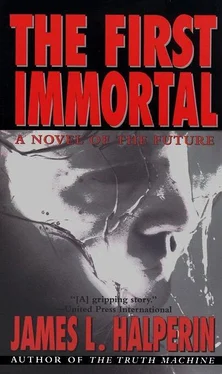“Just tell me. Anything.
Virginia answered, completely straight-faced: “Give me a lock of Kimber’s hair. I’d like to have her cloned.”
While all three of us in my office were laughing, Kimber somewhat nervously, Virginia looked down at her update screen. “His memory’s still there. He’ll be fine.”
When Father Steven Jones first saw Gary, he didn’t recognize him. On the day they’d first met, Gary had been fifty-four years old, his frame already lopsided after decades of hobbling on a shortened left leg; very different from his present, perfectly proportioned, twenty-three-year-old physical aspect.
“Hey, stranger,” Gary said. “Welcome to the year 2083.”
“Gary?”
“Yep. It’s me.”
“It’s 2083?”
Gary nodded.
“Holy Trinity! It really is you, isn’t it…?”
Soon their conversation veered toward the accident. “Gary, I tried to warn you about the wave, but it was too close and too bloody fast.”
“I’m sure it was… Hey. You remember the accident?”
“Uh-huh. It being our last required early-morning excursion and all…”
“It was?”
Of course. After that sunrise, no reason to go back. Guess that’s why the whole morning made such an impression on me. Where’s the painting displayed, anyhow? I can’t wait to see it.”
Gary lowered his eyes in frustration, overcome by losing what he now understood had actually been in his grasp. “I never finished it.”
“What? You’re joking…”
Gary shook his head slowly. He wanted to cry. “Steve, I lost my short-term memory. Nothing left of that morning at all.”
“Oh, no,” Father Steve said, now also shaking his head, intent, searching.
“It was really a perfect sunrise? One that would’ve completed the painting?”
“So you said. Even looked pretty good to my Philistine eyes, though I don’t know how I could ever explain what was different about it.”
“No, of course not. Damn!” Gary said, “But, hey, at least you’re here. I imagine you’ve noticed you look like a twenty-three-year-old kid. Should feel like one, too.”
“I do. How long will it last?”
“On average, oh, about 1,100 years.” Gary smiled. “Sound okay to you?”
“Praise be to God!” Suddenly Father Steve grinned. “By the way, seems to me I had my wristband set on ‘Document’ while we were out in the boat.”
The implication of that revelation quickly dawned on Gary. “You mean the sunrise…”
Father Steve nodded. “Safely stored in my private archives. Unless it was erased in some monumental worldwide cataclysm. Anything like that you haven’t mentioned yet?”
Gary laughed in unmistakable glee. “Nope.”
“Then we can view it whenever you want.”
November 16, 2083
—According to newly released data, average human intelligence rose by .93% last year, the highest annual increase since 2075, the year Mnemex was introduced. If every person on earth were tested today based on 1983 “IQ” standards, 143.4 would be the median score, a figure many specialists deem misleadingly low. “We can’t employ today’s standards when comparing modern intelligence to that of a century ago because we have no reliable statistical data on century-old human artistic, interpersonal, musical, kinesthetic, and emotional aptitudes. Intelligence tests were simply not as comprehensive then as they are today,” notes Yale intelligence expert Dr. Howard Starmont, who ascribes this year’s increase to eugenics, improved nutrition, advanced teaching AI systems, and various medical enhancements. “Unfortunately, our motivation to excel, as best we can measure it, has been steadily decreasing even as our intellectual capabilities have grown.”—In a move considered by most citizens to be long overdue, polygamy is officially legalized worldwide. With several million de facto polygamous marriages formed over the last 17 years as suspended spouses of remarried widows and widowers underwent revivification, the laws have long been deemed hypocritical. “Today’s legislation finally halts a disgraceful injustice,” explains Swiss Senator Alain Haberling. “Why must one spouse be temporarily and needlessly frozen, just so the other can legally take a second husband or wife?”
Jan sat in her pod facing Sigmund Freud. As always, she felt much better now than when her session had started, but her hour was nearly gone. Another thirty minutes sure would have been nice.
Normally, she preferred Robert Steinberg. He was easier to relate to, especially since she and the renowned Dartmouth researcher had been born, frozen, and revived at roughly the same times. Besides, of all the shrinks from whom she could have chosen, Steinberg was by far the best looking.
Financial considerations had not induced her to opt for Freud. Even with the royalties that Virtual Analysis Ltd. paid the reliving Steinberg for use of his likeness and proprietary methods, a session with him still cost less, in real terms, than a movie ticket had during the twentieth century. No, she chose Freud this time to enjoy a change of pace, and maybe also just to remind herself of what a fifty-year-old, never-rejuvenated human being looked like.
Jan felt a powerful seduction from the pod: the Covenant of Safety. No matter what she said to Steinberg or Freud or any of her other AI-spawned companions, her words could never come back. Outside, in the world of flesh-beyond-pixels, the most innocent statements, even those spoken in confidence, could set off ricochets and boomerangs; nasty surprises and unintended consequences.
But that could not happen in the world of virtual humans. Within this barely reduced dimensional context, you could say or do anything without fear of its effect on others. How easy the self-seduction? Jan often wondered how VR addiction had managed to avoid becoming a genuine pandemic.
She was actually grateful that her father had instructed the AIs to limit each of them to an hour a day. Of course, what about when she was independent, living on her own? Jan felt this tiny roundworm of uncertainty burrowing through her mind. What would happen when she and her sisters could buy their own VR pods and control their own AIs?
Freud interrupted her thoughts. “You’re confusing love with sex, young woman.”
“I know. Dr. Steinberg tells me the same thing.”
“For a satisfying life, choose love over sex, my dear. It is far more permanent, and thus worthier.”
“But doctor,” she said, her confidence restored, at least temporarily, “I might not have to choose. I know what I need, and this time maybe I can have both…”
Ben stood in the dining room and lifted his ring finger to his mouth. “The first reviews should come across our newsservice within the hour,” he announced through his pager to all family members, whether at home or elsewhere. It was now ten-ten A.M. “I’ll let you know what the critics say the minute they input it.”
Gary Franklin Smith had unveiled The Dawn of Life on the Artnet forty minutes earlier. A few of the world’s top art critics were no doubt already busy writing their analyses. Public opinion mattered more, but critical acclaim might give the work an early boost, speeding its conveyance to artscreens worldwide, adding sorely needed royalty income to Gary’s WCU account.
By now art was extraordinarily cheap to display digitally, and in quality indistinguishable from the actual composition, quite unlike viewing through VR, 3-D, or even an impeccably cleaned window; more akin to examining the picture visually and tactilely, in the flesh, as it were, at a museum or art gallery. Therefore, most homes maintained a dozen or more such screens. Even at three WCUs per artscreen viewing-year, a well-received work could provide its owner a comfortable income.
Читать дальше












